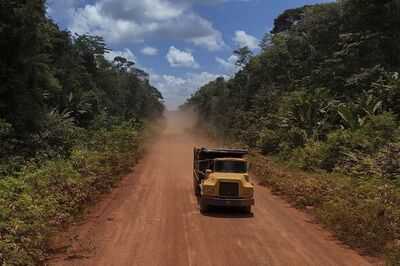
British taxpayers will fund a £52 million road built in the Amazon, supporting a project intended to help the climate. The road in the South American country Guyana that will lead to a tiny village is part of the many schemes funded through the International Climate Finance Initiative (ICF).
ICF is a Government initiative funded by taxpayers, determined to push a green agenda. It was devised under the Conservatives and continued by Labour's Ed Miliband. It will be used to spend £11.6 billion in foreign aid by the end of this financial year. Projects funded by ICF money have included efforts to curb ocean plastic in landlocked African nations, support Nigeria's oil sector, and distribute free condoms in the Congo to reduce population growth and slow deforestation. But an investigation by The Telegraph has revealed that many of the projects have "nothing to do with the environment" - and are criticised by environmentalists themselves. One of them is the construction of the road in Guyana, the investigation has found.
The highway from the Caribbean country's capital, Georgetown, leading all the way to Brazil, has been debated since the 1920s, when Henry Ford offered to build it under the condition that only his cars could drive on it. This has been rejected by the British colonial administration. One hundred years later, the road will be funded by British taxpayers under the guise of climate aid, The Telegraph has revealed.
Guyana, long poor and sparsely populated, saw its fortunes shift after major offshore oil reserves were discovered and production began in 2019. The country is now among the fastest-growing economies and was reclassified as high-income by the World Bank in 2023. Around the same time, construction began on a new £140 million road, funded through a Caribbean Development Bank loan and a £52 million contribution from the UK. Half of the UK's funding came from the ICF, which supports clean energy, preventing deforestation, green infrastructure, and climate adaptation. The new "climate-resilient" highway is meant to address that last goal - unlike the old dirt track, it will remain usable during the heavy annual floods.
But there are several issues with it. First of all, the road will not end in Brazil, but in the village of Mabura, a cluster of buildings with a population of 150, a motel, an empty bar, stray dogs and rusting cars. According to one local, the reason for the road stopping in Mabura is because "that's where the money ran out".

The road begins in Linden, a mining town south of the capital. Work on the 75-mile route started in December 2022, but progress has been slow amid delays and fraud claims. It was meant to be finished next month, yet only 46 miles are complete. The remaining stretch, which is crossed by several small rivers, is the most challenging - and the rainy season is fast approaching.
According to UK aid documents, about 1,400 people live along the route, and it's expected to carry around 52,000 vehicles a year - roughly the same number that use the M25 in five hours. Given Guyana's total population of only around 800,000 (similar to Liverpool), the low traffic levels are unsurprising.
One of the locals told The Telegraph that the road will be "good for this community", supporting business and tourism. However, he thinks it will also lead to the increase of drugs trade and human trafficking.
He's confident the road will eventually reach Brazil, but that extension is not part of the UK-funded project. Signs at both ends clearly show where the British support begins and ends. The road is being paid for through the £349 million UK Caribbean Infrastructure Fund, which is also financing roads in Saint Lucia, Grenada and Belize, and port projects in Saint Vincent and the Grenadines and Montserrat. About 53% of that fund comes from ICF climate finance.
Brazilian investors strongly support the road, seeing it as a shortcut to Georgetown's deep-water port for exporting Amazon goods to the Caribbean and North America. Guyana's oil industry even promotes it as a way to connect South America's oil hubs and boost trade.
But environmentalists have long opposed paving the road, worried about its impact on jaguars, otters, birds, and other wildlife in one of the world's most biodiverse regions. Government documents make no mention of these risks, even though studies show that paved roads often become "arteries of destruction", accelerating deforestation from logging and mining.
John O'Connell, chief executive of the TaxPayers' Alliance, told The Telegraph: "Taxpayers are sick of seeing their hard-earned cash whittled away on questionable projects in far-away places while living standards at home continue to slide.
"Given the state of the public finances and the challenges the Government is facing in terms of cutting spending, green aid is an inappropriate use of precious funds, even if those funds were being used for their intended purpose.
"What these examples show, however, is that this green aid is in many cases not even being used to mitigate the impact of climate change.
"The Government should be winding down these projects and cancelling any future ones."
You may also like

'RJD to bring back jungle raj': BJP renews attack on Tejashwi Yadav; cites 'Shahabuddin's son's nomination'

Kochi-Bengaluru Vande Bharat set to begin soon

'Best' true crime drama about 'deadly smart' serial killer now streaming

'Baron of Westarctica' denied bail in Ghaziabad fake embassy case

PM Modi inaugurates HPCL's petroleum oil depot & other development projects worth Rs 14,260 cr in Chhattisgarh






